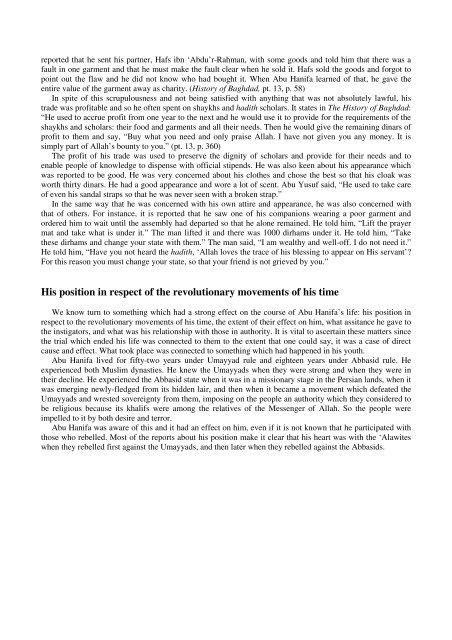Create successful ePaper yourself
Turn your PDF publications into a flip-book with our unique Google optimized e-Paper software.
eported that he sent his partner, Hafs ibn ‘Abdu’r-Rahman, with some goods <strong>and</strong> told him that there was a<br />
fault in one garment <strong>and</strong> that he must make the fault clear when he sold it. Hafs sold the goods <strong>and</strong> forgot to<br />
point out the flaw <strong>and</strong> he did not know who had bought it. When <strong>Abu</strong> <strong>Hanifa</strong> learned of that, he gave the<br />
entire value of the garment away as charity. (<strong>His</strong>tory of Baghdad, pt. 13, p. 58)<br />
In spite of this scrupulousness <strong>and</strong> not being satisfied with anything that was not absolutely lawful, his<br />
trade was profitable <strong>and</strong> so he often spent on shaykhs <strong>and</strong> hadith scholars. It states in The <strong>His</strong>tory of Baghdad:<br />
“He used to accrue profit from one year to the next <strong>and</strong> he would use it to provide for the requirements of the<br />
shaykhs <strong>and</strong> scholars: their food <strong>and</strong> garments <strong>and</strong> all their needs. Then he would give the remaining dinars of<br />
profit to them <strong>and</strong> say, “Buy what you need <strong>and</strong> only praise Allah. I have not given you any money. It is<br />
simply part of Allah’s bounty to you.” (pt. 13, p. 360)<br />
The profit of his trade was used to preserve the dignity of scholars <strong>and</strong> provide for their needs <strong>and</strong> to<br />
enable people of knowledge to dispense with official stipends. He was also keen about his appearance which<br />
was reported to be good. He was very concerned about his clothes <strong>and</strong> chose the best so that his cloak was<br />
worth thirty dinars. He had a good appearance <strong>and</strong> wore a lot of scent. <strong>Abu</strong> Yusuf said, “He used to take care<br />
of even his s<strong>and</strong>al straps so that he was never seen with a broken strap.”<br />
In the same way that he was concerned with his own attire <strong>and</strong> appearance, he was also concerned with<br />
that of others. For instance, it is reported that he saw one of his companions wearing a poor garment <strong>and</strong><br />
ordered him to wait until the assembly had departed so that he alone remained. He told him, “Lift the prayer<br />
mat <strong>and</strong> take what is under it.” The man lifted it <strong>and</strong> there was 1000 dirhams under it. He told him, “Take<br />
these dirhams <strong>and</strong> change your state with them.” The man said, “I am wealthy <strong>and</strong> well-off. I do not need it.”<br />
He told him, “Have you not heard the hadith, ‘Allah loves the trace of his blessing to appear on <strong>His</strong> servant’?<br />
For this reason you must change your state, so that your friend is not grieved by you.”<br />
<strong>His</strong> position in respect of the revolutionary movements of his time<br />
We know turn to something which had a strong effect on the course of <strong>Abu</strong> <strong>Hanifa</strong>’s life: his position in<br />
respect to the revolutionary movements of his time, the extent of their effect on him, what assitance he gave to<br />
the instigators, <strong>and</strong> what was his relationship with those in authority. It is vital to ascertain these matters since<br />
the trial which ended his life was connected to them to the extent that one could say, it was a case of direct<br />
cause <strong>and</strong> effect. What took place was connected to something which had happened in his youth.<br />
<strong>Abu</strong> <strong>Hanifa</strong> lived for fifty-two years under Umayyad rule <strong>and</strong> eighteen years under Abbasid rule. He<br />
experienced both Muslim dynasties. He knew the Umayyads when they were strong <strong>and</strong> when they were in<br />
their decline. He experienced the Abbasid state when it was in a missionary stage in the Persian l<strong>and</strong>s, when it<br />
was emerging newly-fledged from its hidden lair, <strong>and</strong> then when it became a movement which defeated the<br />
Umayyads <strong>and</strong> wrested sovereignty from them, imposing on the people an authority which they considered to<br />
be religious because its khalifs were among the relatives of the Messenger of Allah. So the people were<br />
impelled to it by both desire <strong>and</strong> terror.<br />
<strong>Abu</strong> <strong>Hanifa</strong> was aware of this <strong>and</strong> it had an effect on him, even if it is not known that he participated with<br />
those who rebelled. Most of the reports about his position make it clear that his heart was with the ‘Alawites<br />
when they rebelled first against the Umayyads, <strong>and</strong> then later when they rebelled against the Abbasids.














